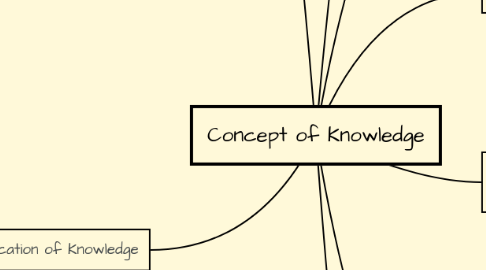
1. Why classify knowledge?
1.1. Reasons
1.1.1. The infinite nature of knowledge
1.1.1.1. Numerous/various/dissimilar/of different degrees/not of equal value
1.1.2. Responsibility to pursue
1.1.2.1. Seeking knowledge is obligatory
1.1.3. Finitude of human life
1.2. Purposes
1.2.1. To prioritize/to hierarchize
1.2.1.1. To order knowledge/sciences according to their importance and urgency
1.2.2. To facilitate learning
1.2.2.1. To serve as a general guide to learning so that students choose to only study subjects that are really beneficial to them
2. Classification of Knowledge
2.1. Eternal/Absolute (Qadim)
2.1.1. Characteristic
2.1.1.1. Divine/God
2.1.1.2. Perfect/Complete
2.1.1.3. Absolutely true/absolutely complete
2.1.1.4. Changeless/eternal
2.2. New/Limited (Jadid)
2.2.1. Gifted
2.2.1.1. Natural/primary/instinctive knowledge (daruri)
2.2.1.1.1. Knowledge imparted in the very nature of the creation like the instinctive knowledge of animals and human babies
2.2.1.2. Sacred/revealed knowledge
2.2.1.2.1. Knowledge that Allah teaches men by way of Revelation to His Messengers
2.2.2. Acquired knowledge
2.2.2.1. Acquired through effort by way of reflection, sense perception and experiment, experience
2.2.2.1.1. Blameworthy (prohibited knowledge)
2.2.2.1.2. Praiseworthy (recommended knowledge)
2.2.3. Characteristic
2.2.3.1. Given by Allah to His creature
2.2.3.1.1. Angels
2.2.3.1.2. Prophets
2.2.3.1.3. Human beings
2.2.3.1.4. Jinns
2.2.3.1.5. Animals
2.2.3.1.6. The rest of His creation
2.2.3.2. Imperfect/incomplete
2.2.3.3. Relative/conjectural
2.2.3.4. Changing/subject to change
3. Main topic
4. - Sub topic
5. - Explanation/example
6. Definition
6.1. Literally from Arabic word ‘ilm, which means:
6.1.1. Al-Ma’rifah (المَعْرِفَةُ): knowing by experiment
6.1.2. Al-Fiqh (الفِقْهُ): Understanding
6.1.3. Tadabbur (تَدَبُّرُ): Observation
6.1.4. Basiran (بَصِيرًا ): Mental perception
6.1.5. Tadhakkur (تَذَكُّرُ): Remembrance
6.1.6. Tafakkur (تَفَكُّرُ): Thought
6.2. Technically:
6.2.1. Realization of the meanings of things (Al-Ghazzali)
6.2.2. The arrival of the ma‘na (meaning) of an object in the soul & its arrival at the meaning. (Al-Attas)
6.2.3. Realization of something in its true nature
6.2.4. A firm belief that accords with the reality of things (47: 19)
7. Knowledge vs Information
7.1. Knowledge
7.1.1. Involves a personal experience
7.1.2. Knowledge is made up of factors such as information, beliefs and experiences
7.1.3. Can be shared but might be perceived differently
7.2. Information
7.2.1. General data expressed by numbers, words, images and sounds
7.2.2. Can be shared, much more easily understood by everyone
7.2.3. Perceived differently
8. Degrees of knowledge
8.1. Knowledge by inference (‘Ilm al-Yaqin)
8.2. Knowledge by perception & observation (‘Ayn al-Yaqin)
8.3. Knowledge by inner experience (Haqq al-Yaqin)
9. Purpose of Seeking Knowledge in Islam
9.1. To practice with it. This is what Prophet Muhammad (pbuh) asked in His prayers:
9.1.1. "O Allah! Make my Ilm profitable for me, give me knowledge which is profitable and add in my knowledge.” (Tirmidhi, Da‘awat, 128)
9.1.2. “O Allah! I seek your refuge from useless knowledge.” (Tirmidhi, Da‘awat, 68)
9.2. To achieve the happiness of both worlds (hasanah fi al-Dunya wa al-Akhirah)
9.2.1. This world is like a field in which our actions are sown like seeds and they grow into plants which are then harvested in the next world
